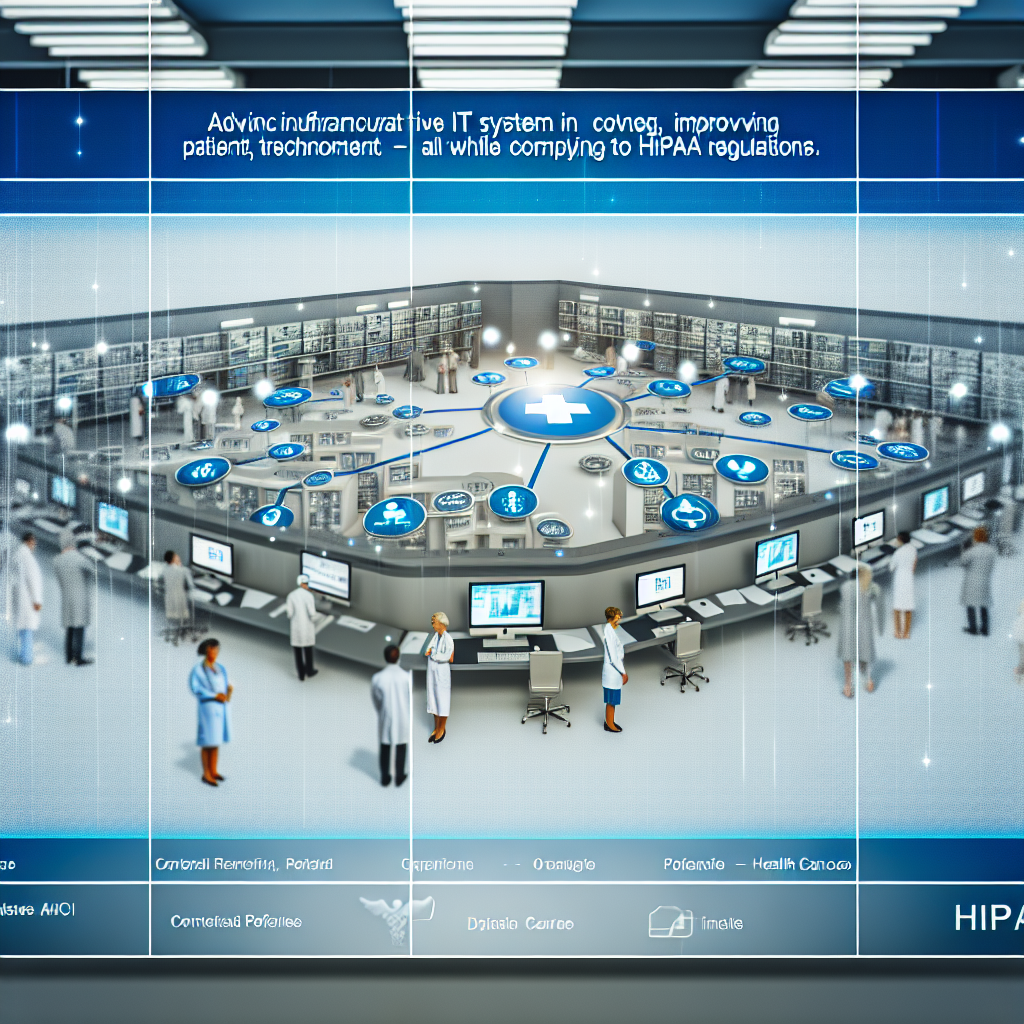Enhancing Clinical Support Through Advanced Healthcare Systems and IT Integration
In the rapidly evolving landscape of healthcare, the integration of advanced information technology systems has become a cornerstone for enhancing clinical support and improving patient outcomes. As healthcare systems strive to meet the increasing demands of patient care, the adoption of modern IT strategies is proving indispensable. These strategies not only streamline operations but also facilitate a more efficient and effective healthcare delivery process.
One of the primary ways in which IT integration enhances clinical support is through the implementation of electronic health records (EHRs). EHRs provide a comprehensive, digital version of a patient’s paper chart, making information readily accessible to authorized healthcare providers. This accessibility ensures that clinicians have up-to-date patient information at their fingertips, which is crucial for making informed decisions. Moreover, EHRs facilitate better coordination among healthcare providers, reducing the likelihood of errors and improving the overall quality of care.
In addition to EHRs, telemedicine has emerged as a vital component of modern healthcare IT strategies. Telemedicine leverages digital communication technologies to provide clinical services remotely, thereby expanding access to care, especially in underserved areas. This approach not only enhances patient convenience but also allows healthcare systems to optimize resource allocation. By reducing the need for in-person visits, telemedicine helps alleviate the burden on healthcare facilities, enabling them to focus on patients who require immediate attention.
Furthermore, the integration of advanced data analytics into healthcare systems is transforming the way clinical support is delivered. By harnessing the power of big data, healthcare providers can identify patterns and trends that were previously undetectable. This capability allows for more accurate diagnoses and personalized treatment plans, ultimately leading to improved patient outcomes. Predictive analytics, a subset of data analytics, is particularly beneficial as it enables healthcare providers to anticipate potential health issues before they become critical, thus facilitating proactive interventions.
Another significant advancement in healthcare IT is the use of artificial intelligence (AI) and machine learning. These technologies are being employed to enhance clinical decision-making processes by providing evidence-based recommendations. AI algorithms can analyze vast amounts of data at unprecedented speeds, offering insights that can assist clinicians in diagnosing complex conditions and selecting appropriate treatment options. As a result, AI not only augments the capabilities of healthcare professionals but also contributes to more efficient and accurate patient care.
Moreover, the integration of IT systems in healthcare is fostering a more patient-centered approach. Patient portals, for instance, empower individuals by providing them with access to their health information, appointment scheduling, and direct communication with their healthcare providers. This transparency and accessibility encourage patients to take an active role in managing their health, leading to better adherence to treatment plans and improved health outcomes.
In conclusion, the integration of advanced healthcare systems and modern IT strategies is revolutionizing clinical support. By enhancing the accessibility, accuracy, and efficiency of healthcare delivery, these technologies are paving the way for a more effective and patient-centered healthcare system. As the healthcare industry continues to embrace these innovations, the potential for improved patient outcomes and streamlined operations becomes increasingly attainable. The ongoing evolution of healthcare IT promises to further transform the landscape, ensuring that healthcare systems are well-equipped to meet the challenges of the future.
Top Health IT Trends Shaping Modern Healthcare Systems
In recent years, the healthcare industry has witnessed a transformative shift driven by the integration of modern IT strategies. This evolution is not merely a trend but a fundamental change in how healthcare systems operate, aiming to enhance patient care, streamline operations, and reduce costs. As we delve into the top health IT trends shaping modern healthcare systems, it becomes evident that technology is at the forefront of this transformation.
One of the most significant trends is the adoption of electronic health records (EHRs). EHRs have revolutionized the way patient information is stored and accessed, providing healthcare professionals with real-time data that is crucial for informed decision-making. This digitalization of records not only improves the accuracy of patient information but also facilitates seamless communication among healthcare providers. Consequently, EHRs contribute to more coordinated and efficient care, reducing the likelihood of medical errors and enhancing patient safety.
In addition to EHRs, telemedicine has emerged as a pivotal component of modern healthcare systems. The COVID-19 pandemic accelerated the adoption of telemedicine, highlighting its potential to provide accessible and convenient care. Through virtual consultations, patients can receive medical advice and treatment without the need for physical visits, thus overcoming geographical barriers and reducing the strain on healthcare facilities. This trend is expected to continue growing, as both patients and providers recognize the benefits of remote healthcare services.
Moreover, the integration of artificial intelligence (AI) in healthcare is reshaping diagnostic and treatment processes. AI algorithms can analyze vast amounts of data quickly and accurately, assisting in early disease detection and personalized treatment plans. For instance, AI-powered imaging tools can identify anomalies in medical scans with remarkable precision, aiding radiologists in diagnosing conditions such as cancer at an earlier stage. As AI technology continues to advance, its applications in healthcare are likely to expand, offering new possibilities for improving patient outcomes.
Another trend gaining momentum is the use of wearable technology. Devices such as smartwatches and fitness trackers are increasingly being utilized to monitor patients’ health metrics in real-time. These wearables provide valuable data on vital signs, physical activity, and sleep patterns, enabling healthcare providers to track patients’ health continuously. This real-time monitoring can lead to more proactive and preventive care, as potential health issues can be identified and addressed before they escalate.
Furthermore, the emphasis on data security and privacy has become paramount in the digital age. With the increasing reliance on digital systems, healthcare organizations must prioritize safeguarding sensitive patient information. Implementing robust cybersecurity measures is essential to protect against data breaches and ensure compliance with regulations such as the Health Insurance Portability and Accountability Act (HIPAA). As cyber threats continue to evolve, healthcare systems must remain vigilant and adaptive to protect patient data effectively.
In conclusion, the integration of modern IT strategies in healthcare systems is driving significant advancements in patient care and operational efficiency. From electronic health records and telemedicine to artificial intelligence and wearable technology, these trends are reshaping the healthcare landscape. As technology continues to evolve, healthcare systems must embrace these innovations to meet the growing demands of patients and providers alike. By doing so, they can ensure a future where healthcare is more accessible, efficient, and effective for all.
Ensuring HIPAA Compliance in the Era of Digital Healthcare
In the rapidly evolving landscape of digital healthcare, ensuring compliance with the Health Insurance Portability and Accountability Act (HIPAA) has become more critical than ever. As healthcare systems increasingly integrate modern IT strategies to enhance patient care and streamline operations, they must also navigate the complex regulatory environment that governs patient data privacy and security. The intersection of advanced technology and stringent compliance requirements presents both challenges and opportunities for healthcare providers.
To begin with, the digitization of healthcare records and the widespread adoption of electronic health records (EHRs) have revolutionized the way patient information is stored and accessed. However, this shift also introduces significant risks related to data breaches and unauthorized access. Consequently, healthcare organizations must implement robust security measures to protect sensitive patient information. Encryption, access controls, and regular security audits are essential components of a comprehensive strategy to safeguard data and ensure HIPAA compliance.
Moreover, the rise of telemedicine and mobile health applications has further complicated the compliance landscape. These technologies offer unprecedented convenience and accessibility for patients, but they also require healthcare providers to extend their security protocols beyond traditional boundaries. Ensuring that these platforms are secure and that patient data is transmitted and stored in compliance with HIPAA regulations is paramount. This necessitates a thorough understanding of the technical and administrative safeguards required to protect electronic protected health information (ePHI).
In addition to technological safeguards, healthcare organizations must also focus on the human element of compliance. Training and educating staff on HIPAA regulations and the importance of data privacy is crucial. Employees should be well-versed in identifying potential security threats and understanding the protocols for reporting and responding to data breaches. Regular training sessions and updates on the latest compliance requirements can help foster a culture of security awareness within the organization.
Furthermore, as healthcare systems adopt cloud-based solutions to enhance scalability and efficiency, they must carefully evaluate their cloud service providers. It is essential to ensure that these providers are HIPAA-compliant and that they offer the necessary security features to protect patient data. Establishing clear agreements and conducting regular audits of third-party vendors can help mitigate risks associated with outsourcing data storage and processing.
Another critical aspect of ensuring HIPAA compliance in the digital age is maintaining comprehensive documentation. Healthcare organizations must keep detailed records of their compliance efforts, including risk assessments, security policies, and incident response plans. This documentation not only demonstrates a commitment to compliance but also serves as a valuable resource in the event of an audit or investigation.
In conclusion, the integration of modern IT strategies into healthcare systems offers significant benefits, but it also demands a proactive approach to HIPAA compliance. By implementing robust security measures, educating staff, carefully selecting third-party vendors, and maintaining thorough documentation, healthcare organizations can navigate the complexities of digital healthcare while safeguarding patient information. As technology continues to advance, staying informed about the latest compliance requirements and emerging threats will be essential for healthcare providers to protect both their patients and their reputations.
The Role of Electronic Health Records (EHR) in Modern Healthcare IT Strategies
In the rapidly evolving landscape of healthcare, the integration of modern information technology strategies has become indispensable. At the heart of these strategies lies the implementation of Electronic Health Records (EHR), which serve as a cornerstone for enhancing the efficiency, accuracy, and accessibility of patient information. As healthcare systems strive to improve patient outcomes and streamline operations, EHRs play a pivotal role in transforming traditional practices into more dynamic and responsive models.
The adoption of EHRs marks a significant shift from paper-based records to digital platforms, offering numerous advantages that align with modern healthcare IT strategies. One of the primary benefits of EHRs is the facilitation of seamless information exchange among healthcare providers. This interoperability ensures that patient data is readily available across different healthcare settings, thereby reducing the risk of errors and redundancies. Consequently, healthcare professionals can make more informed decisions, leading to improved patient care and safety.
Moreover, EHRs contribute to enhanced patient engagement by providing individuals with access to their own health information. This transparency empowers patients to take an active role in managing their health, fostering a collaborative relationship between patients and healthcare providers. As a result, patients are more likely to adhere to treatment plans and preventive measures, ultimately contributing to better health outcomes.
In addition to improving patient-provider interactions, EHRs also support healthcare systems in achieving operational efficiency. By automating administrative tasks such as appointment scheduling, billing, and coding, EHRs reduce the burden on healthcare staff, allowing them to focus more on patient care. Furthermore, the digitization of records minimizes the physical storage space required for paper files, leading to cost savings and a more environmentally sustainable approach.
The role of EHRs extends beyond individual healthcare facilities, as they are integral to the broader public health infrastructure. By aggregating data from diverse sources, EHRs enable the analysis of health trends and patterns, which is crucial for public health surveillance and research. This data-driven approach facilitates the identification of emerging health threats and the development of targeted interventions, thereby enhancing the overall resilience of healthcare systems.
Despite the numerous advantages, the implementation of EHRs is not without challenges. Concerns regarding data privacy and security are paramount, as the digitization of health records increases the risk of unauthorized access and cyberattacks. To address these issues, healthcare organizations must invest in robust cybersecurity measures and ensure compliance with regulations such as the Health Insurance Portability and Accountability Act (HIPAA). Additionally, the transition to EHRs requires significant financial investment and training for healthcare professionals, which can be a barrier for some institutions.
Nevertheless, the long-term benefits of EHRs in modern healthcare IT strategies are undeniable. As technology continues to advance, the capabilities of EHRs are expected to expand, incorporating features such as artificial intelligence and machine learning to further enhance decision-making processes. By embracing these innovations, healthcare systems can continue to evolve, providing high-quality, patient-centered care in an increasingly complex and interconnected world.
In conclusion, Electronic Health Records are a fundamental component of modern healthcare IT strategies, offering a multitude of benefits that align with the goals of improving patient outcomes, enhancing operational efficiency, and supporting public health initiatives. While challenges remain, the ongoing development and refinement of EHR systems promise to drive the future of healthcare, ensuring that it remains responsive to the needs of patients and providers alike.
Innovative Tech Integration for Improved Medical Data Management in Healthcare Systems
In the rapidly evolving landscape of healthcare, the integration of innovative technology into medical data management systems has become a pivotal strategy for enhancing the efficiency and effectiveness of healthcare delivery. As healthcare systems worldwide grapple with the challenges of managing vast amounts of patient data, modern IT strategies offer promising solutions that streamline operations, improve patient outcomes, and ensure data security. The adoption of advanced technologies such as artificial intelligence, cloud computing, and blockchain is transforming the way healthcare providers manage and utilize medical data.
Artificial intelligence (AI) is at the forefront of this transformation, offering powerful tools for data analysis and decision-making. By leveraging machine learning algorithms, healthcare systems can analyze large datasets to identify patterns and predict patient outcomes. This capability not only aids in early diagnosis and personalized treatment plans but also enhances operational efficiency by optimizing resource allocation. For instance, AI-driven predictive analytics can forecast patient admission rates, enabling hospitals to better manage staffing and resources. Consequently, AI integration into healthcare data management systems is proving to be a game-changer in delivering timely and accurate medical care.
In addition to AI, cloud computing is revolutionizing the storage and accessibility of medical data. By migrating data to the cloud, healthcare providers can ensure that patient information is readily available to authorized personnel, regardless of their location. This accessibility is crucial for facilitating seamless communication and collaboration among healthcare professionals, particularly in emergency situations where time is of the essence. Moreover, cloud-based systems offer scalable solutions that can accommodate the growing volume of healthcare data, thereby reducing the burden on local servers and minimizing the risk of data loss. As a result, cloud computing is becoming an integral component of modern healthcare IT strategies.
Blockchain technology, though traditionally associated with cryptocurrencies, is also making significant inroads into healthcare data management. Its decentralized and immutable nature provides a secure framework for storing and sharing medical records. By ensuring that data cannot be altered without detection, blockchain enhances the integrity and confidentiality of patient information. This is particularly important in an era where data breaches and cyber threats are on the rise. Furthermore, blockchain can facilitate interoperability among disparate healthcare systems, allowing for the seamless exchange of information while maintaining patient privacy. Thus, the incorporation of blockchain into healthcare IT strategies is a promising development for safeguarding medical data.
While these technologies offer substantial benefits, their integration into healthcare systems is not without challenges. Issues such as data privacy, regulatory compliance, and the need for robust cybersecurity measures must be addressed to ensure the successful implementation of these innovations. Additionally, healthcare providers must invest in training and education to equip their staff with the necessary skills to navigate these advanced systems. Despite these hurdles, the potential advantages of innovative tech integration in medical data management are undeniable.
In conclusion, the integration of cutting-edge technologies into healthcare data management systems is reshaping the way medical information is handled, offering enhanced efficiency, security, and patient care. As healthcare systems continue to adopt modern IT strategies, the focus must remain on overcoming implementation challenges and ensuring that these technologies are used to their fullest potential. By doing so, healthcare providers can harness the power of innovation to improve medical outcomes and deliver high-quality care in an increasingly digital world.
Unlock the future of healthcare with cutting-edge IT strategies! Discover how modern technology is transforming healthcare systems. Dive into “Healthcare IT Insights: Healthcare systems and Modern IT Strategies (45)” now. Learn more.










